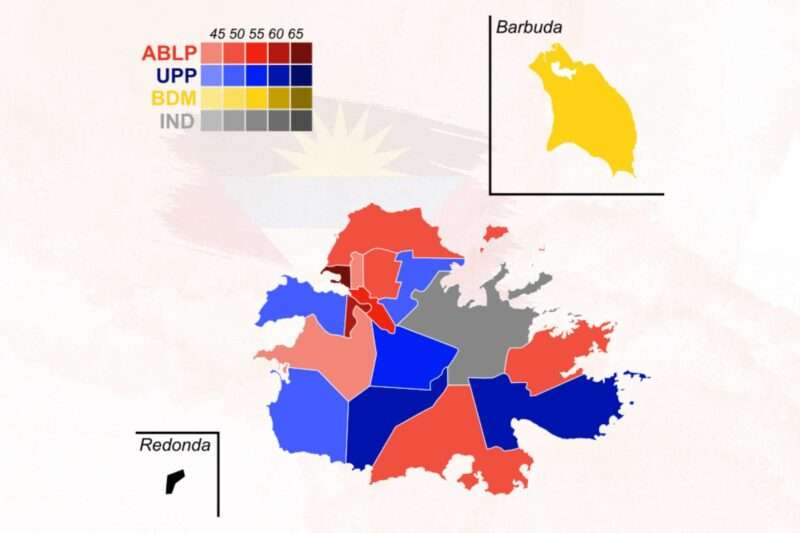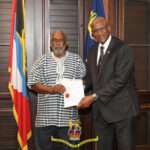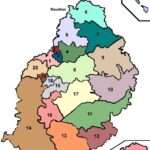
By Kieron Murdoch | Opinion Contributor
As Antigua and Barbuda gets a newly constituted Constituency Boundaries Commission, we are hopeful that this commission will, in the long term, aid in the successful and equitable redrawing of constituency boundaries in Antigua and Barbuda in terms of voter distribution.
Unfortunately, there is already a sour taste in the mouths of many after the Government’s Chief of Staff made what he later said was an error when he stated that three Labour Parliamentarians – two MPs and a Senator – would be nominated to the commission.
This statement uttered during a post-Cabinet press conference was later corrected after it generated some concern since the Constitution expressly prohibits MPs and Senators from serving on the Commission. The Prime Minister has since written to the Governor General nominating three other individuals, whilst the government says the Opposition Leader will be asked to make his nomination.
We hope that the body will be given the resources and the backing to execute its work and that its members will conduct their duties without fear or favour as the cliche goes. Antigua and Barbuda needs a range of reforms and fair constituencies is one of them. We have some disproportionality in our 17 electorates which needs to be addressed.
In the last general election, there were, for example, 1876 and 1258 registered voters in St. Phillip’s North and South respectively. In St. John’s City West, City East and City South, there were 3053, 2166 and 2060 registered voters respectively. Meanwhile, in St. John’s Rural West, St. John’s Rural East, All Saints West and St. George, there were 5440, 5004, 5021 and 5883 registered voters respectively.
It should be understood that it is natural for there to be disparity in areas over time as certain communities experience growth more rapidly than others. But persistent disparity over time suggests that too the issue is not being taken seriously enough.
More challenging is the absence of political will to give effect to the needed changes through the approved constitutional process. After all, which politician red or blue, wants to change their boundaries if they have been winning comfortably? Whether your constituency is big or small, once you’re winning, you’d prefer it to remain the same. You wouldn’t want voters who supported you redrawn into a neighbouring area, and you wouldn’t want voters who hate your guts redrawn into yours.
This is perhaps why, for the most part, in this century, the issue of constituency boundaries has not been a major political sticking point. Seriously, when last did we have the Reds when they were in opposition or the Blues in opposition today seriously kick up a storm about the fairness of the boundaries? Nevertheless, periodic shifts must be made to adjust for population growth, decline and stagnation in various areas. It’s also not always the easiest task.
The number of registered voters in a given area may not necessarily reflect the actual voter-eligible population. You may have people going unregistered and choosing not to vote. So for example, it may be the case that 5,000 people live in constituency A and 5,000 people live in constituency B. But in Constituency A, there are 3500 registered voters and in Constituency B there are just 1500. The real question becomes, why do people in Constituency B opt not to get registered?
Voter turnout can also skew the impression of constituency size if it is considerably lower in certain areas, giving the impression that the constituency is smaller when if fact registered voters have just stayed home for one reason or another.
That said, we hope to see the Constituency Boundaries Commission duly constituted soon and able to execute its work. We hope it is ultimately comprised of individuals who stand up to public scrutiny when it comes to their commitment to public service and integrity. We hope its recommendations will be fair and sensible and given that they are, we hope they will be swiftly implemented.
Rural West MP Richard Lewis recently called for the government to take electoral reform more seriously. While we find ourselves in agreement with the good gentleman, we cannot help but point out that neither his party nor the ruling Labour Party has made the issues of electoral reform, political finance reform, or constitutional reform, serious elements of any political platform within the last decade.
We must therefore conclude that talk of reform suits politicians when they are in opposition and would benefit from operating in a fairer and more democratic system with greater checks and balances. The true test is in whether they Implement such reforms when they have the opportunity and the power to do so, which they seldom ever do, as it would limit their power and perhaps their re-election chances whilst they are in government.
Many changes are needed to the way we practice parliamentary governance and the way we run elections. We’ve spoken about them. Number one on our list is a law to ban politicians and their agents from giving voters any form of valuable consideration at any time. This is something that, while necessary, is fundamentally at odds with the way we have come to practice politics and the rather base and unevolved expectation that we have that it is the duty of politicians to lavish us with gifts and cash support for our life needs.
We must also redesign the framework that exists to prevent fraudulent voter transfers for greater effectiveness. Yet, as much as we need these things, we ought to understand given our political culture that our political elites are not inclined to support these things where and when they risk diminishing their power and their ability to be elected.
They must therefore be compelled by a citizenry that makes it clear that they will not accept “no reform” as policy.
About the writer:
Kieron Murdoch is an opinion contributor at antigua.news. He worked as a journalist and later as a radio presenter in Antigua and Barbuda for eight years, covering politics and governance especially. If you have an opinion on the issues raised in this editorial and you would like to submit a response by email to be considered for publication, please email [email protected].






No matter what political party you support or even if you are neutral you cannot help but agreeing with the main power points of this editorial. In my opinion, it is factual and deals with the situation we are facing and have been facing in this country for along time now